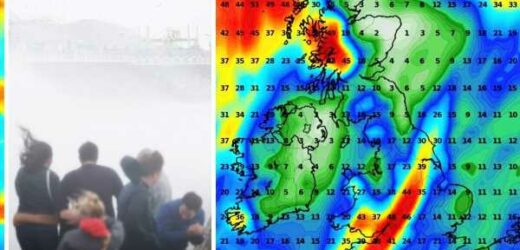UK weather: Met Office forecasts rain and mild conditions
We use your sign-up to provide content in ways you’ve consented to and to improve our understanding of you. This may include adverts from us and 3rd parties based on our understanding. You can unsubscribe at any time. More info
Tonight will mark the start of a tirade of unsettled weather conditions hitting different parts of Britain intermittently over the next 10 days. The nation should prepare for imminent weather warnings, an independent forecaster has said, with the Met Office also predicting parts of Scotland could be battered by 70mph winds by this weekend. Nearly every part of the country should expect to see heavy rainfall and gusty winds, but some areas will come off worse. Jim Dale, senior meteorologist at British Weather Services, gave a rundown to Express.co.uk about what this means for the ever-changing January weather picture.
He echoed similar reports from the Met Office which indicates a blast of colder air from Scandinavia coming across to Britain this weekend. While it’s essentially colder air from the east – it’ll bring nothing like the Beast from the East’s chaos in 2018.
Instead it’s likely to bring more showers. When asked if the UK is facing an unsettled period in the coming days, he said: “Broadly yes, especially in the west and far north west – and it’s all care of the Atlantic conveyor belt. Some localised flooding can be expected.
“It’ll be from tonight but it’s a long piece of string so impacts will only gradually materialise over the next 10 days or so. Initially temperatures will dip into this weekend then rise again as next week unfolds.
“I think there will be warnings issued along the way, likely lower level unless a region takes more than they can handle again – thinking Dumfries and Galloway in Scotland, for example.”


The Met Office also alludes to a continuation of more unsettled weather throughout January, and potentially into the start of February. In its long range forecast, which starts on January 9 until February 2, it says: “Unsettled and relatively mild weather is most likely to characterise the beginning of this period, with showers or longer spells of rain likely for many areas.
“Windward coasts and hills, especially in the west, seeing the heaviest and most frequent showers, but also a chance of some heavy rain across southern areas for a time.
“Any snowfall probably confined to the highest hills in the north.
“Moving into mid-January a trend towards less unsettled weather is expected, with more drier interludes for most.


Such drier spells would see an increase in overnight frosts and morning fog patches as well as scope for lower daytime temperatures.
“Showers and longer spells of rain are still possible although mainly restricted to the north and northwest.”
It continues: “Mid-January is likely to bring less unsettled conditions, with more prolonged drier interludes for most areas increasing the incidence of overnight frost and morning fog and perhaps lower daytime temperatures too.
“Showers or longer spells of rain are possible, however mainly confined to the north and northwest. Towards the end of the period, a return to generally milder and unsettled conditions is the most likely outcome, with spells of wet and windy weather probable across all areas with only brief dry interludes.”
While colder weather may be set to peak and drop over the next few weeks, the Met Office has looked back at last year which has now officially been dubbed as the warmest on record.
It says: “After a notably warm start to the year in 2022, with New Year’s Day the warmest on record, the mild theme was replicated through much of the year with many more warmer than average days than cooler than average days. The annual mean temperature reached record breaking levels during the exceptional heatwave in July and despite a notable cold spell in December remained at record levels for the year overall.”
But looking ahead to the rest of 2023, head of the Met Office National Climate Information Centre, Dr Mark McCarthy, said: “Even with the influence of climate change we don’t expect every year to be the hottest on record from now on.
“Natural variability of the UK climate means there will always be some variation year to year, however looking at longer term trends it is easy to pick out the influence climate change is having over time.”
Source: Read Full Article

